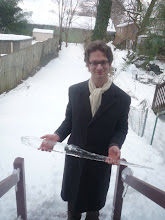Vaughan Williams returned to England and began composing on his own, first producing incidental music for a Cambridge production of Aristophenes's The Wasps in 1909. This was more controversial than most incidental music for plays, to say the least, for the following reasons:
- Up until this point, most music done to complement ancient theatre was based upon a dreadfully half-arsed conception of what music had been like two thousand years ago. Vaughan Williams's suite was very very English. It wasn't about the 'Aristophanes' part of 'Cambridge production of Aristophanes', it was about the 'Cambridge' part, decidedly and unapologetically. Vaughan Williams was not really a nationalist but he believed strongly in the power of a place's own musical traditions above and beyond any pseudo-formalist considerations.
- Despite this, Vaughan Williams was formal; his work was tonal and had melodies and harmonies.
- Vaughan Williams was a huge troll. He flat-out lied about what sort of music he was planning on writing because he thought that points 1 and 2 were fucking funny.
Later on Vaughan Williams composed his first two symphonies before leaving to fight in World War I despite being over forty years old. He met a fellow musician, a gay guy named George Butterworth who died in the asinine Battle of the Somme, shot through the head by a German sniper. Towards the end of the war Vaughan Williams became Music Director for the British Army despite having gone deaf in one ear due to the same sniper fire and heavy artillery that killed Butterworth. After finishing with this job he wrote one of the great Masses, which almost didn't get performed because of his agnosticism (the fact that he was friends with Cosmo Lang, the liberal Archbishop of Canterbury, helped a lot in getting it eventually done).
In the forties Vaughan Williams, now in his seventies and more adventurous musically than ever, did a soundtrack for the adventure film Scott of the Antarctic, which later became his seventh symphony, titled 'Sinfonia Antartica'. This was the first 'proper' symphony to use electronic instruments such as theramins and wind machines and to this day possibly the only one to use them alongside lutes. His organ chords to evoke frozen waterfalls, which can be heard here starting at about 7.00 (though you'll miss the buildup if you start it there), are basically the musical equivalent of a scream of triumph--in context, on the part of the entire continent of Antarctica and the entire concept of Winter.
Naturally, these things made people call Sinfonia Antartica 'problematic' and venture that RVW was going senile (he wasn't).
In the last decade of his life RVW married a poet named Ursula Lock Wood, with whom he had been conducting a romantic friendship since the thirties. Ursula was thirty-nine years younger than Ralph and their relationship wasn't really sexual so much as it was them being very close friends, totally on the same wavelength, and RVW not wanting to be put in a home. He died in 1958 at the age of eighty-five. Ursula died in 2007 at the age of ninety-six.
Ralph Vaughan Williams was awesome and an ornery old man at heart even when he was a young man. He managed to change the boundaries of music without going as far afield from traditional melodies as many of his contemporaries and produced some achingly beautiful and truly haunting pieces that hold up incredibly well to-day. He was at once a culture hero, preserving the memories of beautiful folk cultures in his music even as they vanished into the oblivion of the centuries, and a successful troll who was successful. He is buried in Westminster Abbey, between Henry Purcell and Pitt the Elder.


No comments:
Post a Comment